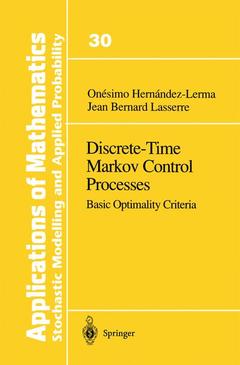Discrete-Time Markov Control Processes, Softcover reprint of the original 1st ed. 1996 Basic Optimality Criteria Stochastic Modelling and Applied Probability Series, Vol. 30
Langue : Anglais
Auteurs : Hernandez-Lerma Onesimo, Lasserre Jean B.

This book presents the first part of a planned two-volume series devoted to a systematic exposition of some recent developments in the theory of discrete-time Markov control processes (MCPs). Interest is mainly confined to MCPs with Borel state and control (or action) spaces, and possibly unbounded costs and noncompact control constraint sets. MCPs are a class of stochastic control problems, also known as Markov decision processes, controlled Markov processes, or stochastic dynamic pro grams; sometimes, particularly when the state space is a countable set, they are also called Markov decision (or controlled Markov) chains. Regardless of the name used, MCPs appear in many fields, for example, engineering, economics, operations research, statistics, renewable and nonrenewable re source management, (control of) epidemics, etc. However, most of the lit erature (say, at least 90%) is concentrated on MCPs for which (a) the state space is a countable set, and/or (b) the costs-per-stage are bounded, and/or (c) the control constraint sets are compact. But curiously enough, the most widely used control model in engineering and economics--namely the LQ (Linear system/Quadratic cost) model-satisfies none of these conditions. Moreover, when dealing with "partially observable" systems) a standard approach is to transform them into equivalent "completely observable" sys tems in a larger state space (in fact, a space of probability measures), which is uncountable even if the original state process is finite-valued.
1 Introduction and Summary.- 1.1 Introduction.- 1.2 Markov control processes.- 1.3 Preliminary examples.- 1.4 Summary of the following chapters.- 2 Markov Control Processes.- 2.1 Introduction.- 2.2 Markov control processes.- 2.3 Markov policies and the Markov property.- 3 Finite-Horizon Problems.- 3.1 Introduction.- 3.2 Dynamic programming.- 3.3 The measurable selection condition.- 3.4 Variants of the DP equation.- 3.5 LQ problems.- 3.6 A consumption-investment problem.- 3.7 An inventory-production system.- 4 Infinite-Horizon Discounted-Cost Problems.- 4.1 Introduction.- 4.2 The discounted-cost optimality equation.- 4.3 Complements to the DCOE.- 4.4 Policy iteration and other approximations.- 4.5 Further optimality criteria.- 4.6 Asymptotic discount optimality.- 4.7 The discounted LQ problem.- 4.8 Concluding remarks.- 5 Long-Run Average-Cost Problems.- 5.1 Introduction.- 5.2 Canonical triplets.- 5.3 The vanishing discount approach.- 5.4 The average-cost optimality inequality.- 5.5 The average-cost optimality equation.- 5.6 Value iteration.- 5.7 Other optimality results.- 5.8 Concluding remarks.- 6 The Linear Programming Formulation.- 6.1 Introduction.- 6.2 Infinite-dimensional linear programming.- 6.3 Discounted cost.- 6.4 Average cost: preliminaries.- 6.5 Average cost: solvability.- 6.6 Further remarks.- Appendix A Miscellaneous Results.- Appendix B Conditional Expectation.- Appendix C Stochastic Kernels.- Appendix D Multifunctions and Selectors.- Appendix E Convergence of Probability Measures.- References.
Date de parution : 09-2012
Ouvrage de 216 p.
15.5x23.5 cm
Thème de Discrete-Time Markov Control Processes :
Mots-clés :
Markov property; linear optimization; management; model; operations research; production; programming; quality; science
© 2024 LAVOISIER S.A.S.



